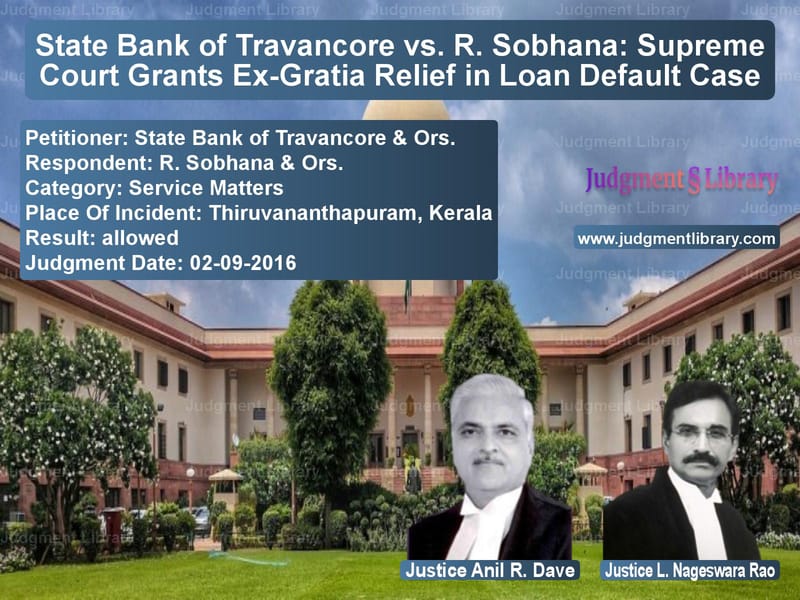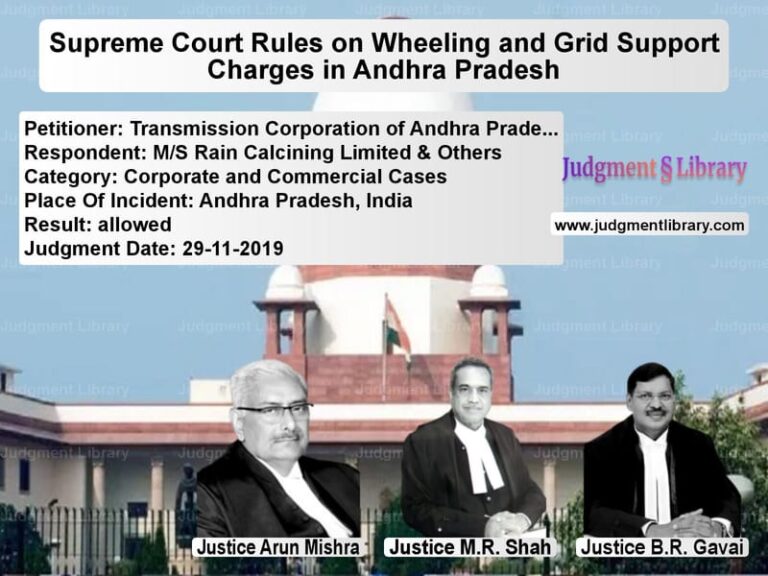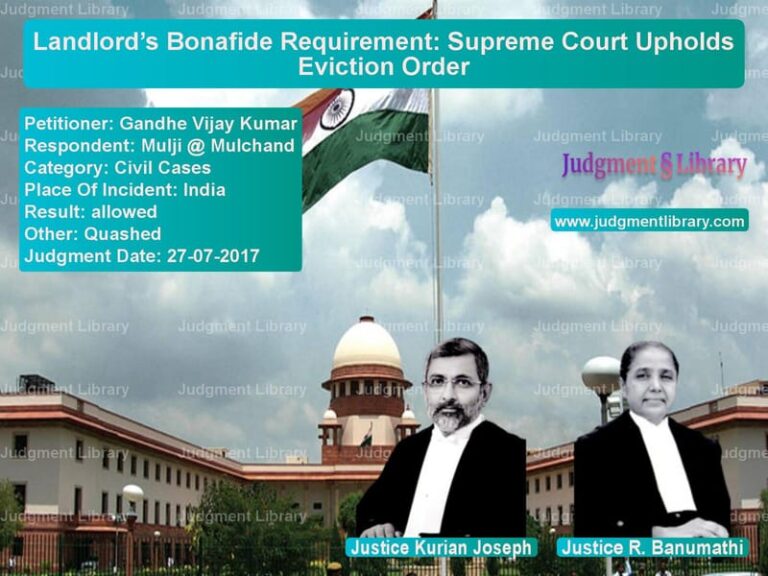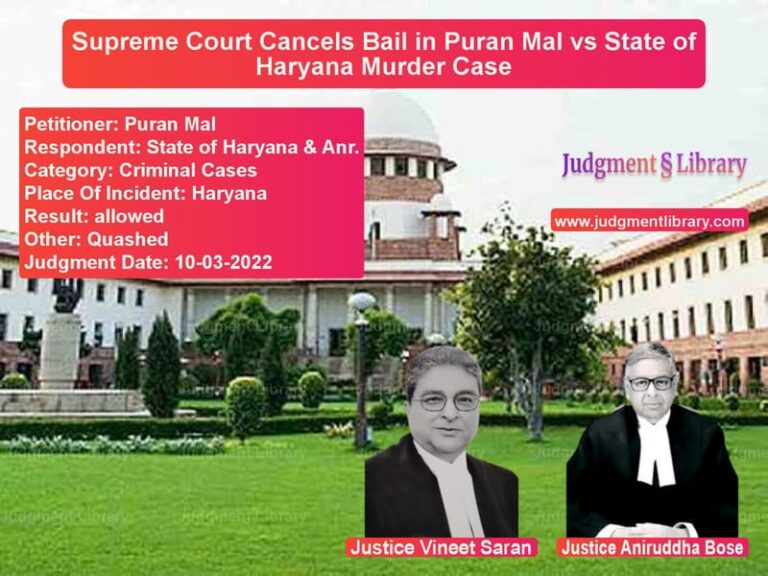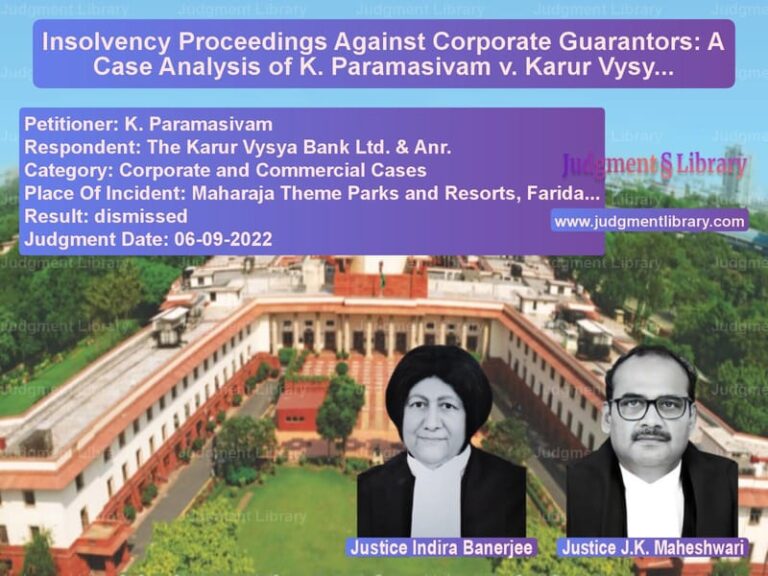State Bank of Travancore vs. R. Sobhana: Supreme Court Grants Ex-Gratia Relief in Loan Default Case
The case of State Bank of Travancore & Ors. vs. R. Sobhana & Ors. revolves around a loan default dispute that led to a judicial auction of mortgaged property. The Supreme Court had to decide whether the borrowers, who had defaulted on a small loan, were entitled to claim a share in the proceeds of the auction conducted by the bank.
Background of the Case
The first respondent, R. Sobhana, along with her late husband, had taken a loan of Rs. 15,000 from the State Bank of Travancore on July 4, 1981. To secure the loan, they created an equitable mortgage by depositing title deeds for a property located in Vanchiyoor village, Thiruvananthapuram. However, due to default in repayment, the loan account became irregular, and the bank filed a recovery suit.
Legal Proceedings
Filing of Suit and Auction
- The bank filed O.S. No. 500 of 1983 before the Subordinate Judge, Thiruvananthapuram, for the recovery of Rs. 19,500 with interest.
- The suit was decreed on August 25, 1994, and the property was put up for auction.
- Since no other bidders came forward, the bank itself acquired the property in the auction, and a sale certificate was issued on February 22, 1994.
Bank’s Sale of Property and Borrowers’ Claim
- In 2007, the bank sold the property through a tender process for Rs. 10,10,001.
- The borrowers (respondents) approached the bank, seeking the return of the surplus amount after adjusting the loan amount and also demanded rent collected from the property between 1996 and 2006.
- The bank refused, arguing that it had become the absolute owner of the property.
High Court’s Decision
- The borrowers filed W.P. (C) No. 32911 of 2011 before the Kerala High Court, seeking a direction to the bank for refunding the surplus sale proceeds and rent.
- The Single Judge dismissed the writ petition on February 28, 2012, holding that after the sale certificate was issued, the borrowers had no legal claim over the property or its proceeds.
- The borrowers then filed W.A. No. 1077 of 2012 before the Division Bench of the Kerala High Court.
- The Division Bench, considering the financial distress and health conditions of the borrowers, directed the bank to pay Rs. 6.5 lakhs to them.
- The bank challenged this order before the Supreme Court.
Supreme Court’s Judgment
The Supreme Court bench, comprising Justice Anil R. Dave and Justice L. Nageswara Rao, delivered the judgment on September 2, 2016. The key points from the ruling were:
Bank’s Position
- The bank argued that once it had acquired ownership through a judicial sale, it was under no legal obligation to return any amount to the borrowers.
- It relied on Section 65 of the Code of Civil Procedure to assert that title had been perfected in 1994.
- The bank contended that the Kerala High Court had erred in making adverse remarks against its business conduct.
Borrowers’ Position
- The respondents (borrowers) acknowledged that they had no legal claim but pleaded for financial relief given their dire situation.
- They pointed out that they had originally borrowed only Rs. 15,000, but their property was later sold for over Rs. 10 lakhs.
- They argued that the bank had profited significantly from their financial misfortune.
Key Observations by the Supreme Court
- The Court held that the bank had not acted illegally in acquiring and selling the property.
- The Court ruled that the Division Bench should not have criticized the bank, and these remarks were ordered to be expunged.
- However, recognizing the borrowers’ extreme financial and medical hardships, the Court directed the bank to pay Rs. 5 lakhs as an ex-gratia (compassionate payment).
Final Ruling
- The Supreme Court allowed the appeal and set aside the Kerala High Court’s order directing the bank to pay Rs. 6.5 lakhs.
- However, to provide relief to the borrowers, it directed the bank to pay Rs. 5 lakhs within eight weeks as a goodwill measure.
Impact of the Judgment
- The ruling affirms that banks have the legal right to retain surplus proceeds from judicial auctions but may still be subject to moral and equitable considerations.
- The Court balanced legal principles with humanitarian concerns, ensuring fairness in extreme cases.
- It provides a precedent for financial institutions dealing with similar claims from distressed borrowers.
Don’t miss out on the full details! Download the complete judgment in PDF format below and gain valuable insights instantly!
Download Judgment: State Bank of Travan vs R. Sobhana & Ors. Supreme Court of India Judgment Dated 02-09-2016-1741883952712.pdf
Direct Downlaod Judgment: Direct downlaod this Judgment
See all petitions in Banking Regulations
See all petitions in Debt Recovery
See all petitions in Public Sector Employees
See all petitions in Judgment by Anil R. Dave
See all petitions in Judgment by L. Nageswara Rao
See all petitions in allowed
See all petitions in supreme court of India judgments September 2016
See all petitions in 2016 judgments
See all posts in Service Matters Category
See all allowed petitions in Service Matters Category
See all Dismissed petitions in Service Matters Category
See all partially allowed petitions in Service Matters Category

